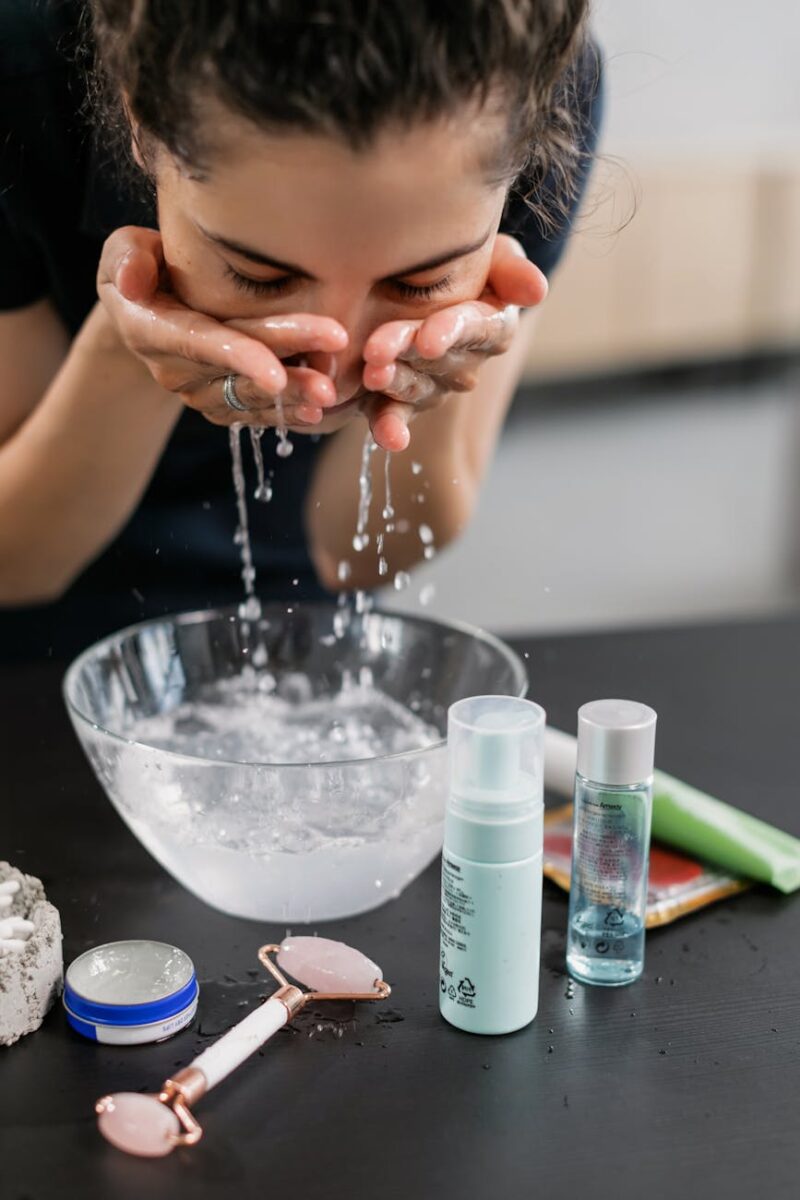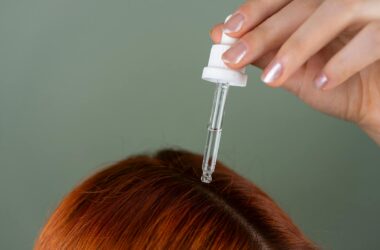Hydroquinone is an ingredient that has been used in topical skin lightening creams for years.
Many individuals have used hydroquinone as a way of lightening the skin on the face, hands, and body. However, is hydroquinone safe for your face?
Is Hydroquinone Safe For Your Face?
The safety of hydroquinone is a subject of frequent debate among dermatologists, but the short answer is—yes, it’s safe. But like many skin-care ingredients, it’s best to use it in moderation.
“There’s really no question that hydroquinone is an effective ingredient,” says Doris Day, a New York City dermatologist and author of Forget the Facelift. “There are always going to be naysayers, but I think the good outweighs the bad.”
Hydroquinone is used as a skin brightener to reduce the appearance of age spots, freckles, and other types of discoloration.
It works by inhibiting melanin production thereby reducing the amount of pigment in your skin.
This can make it helpful in treating melasma, a common side effect of pregnancy that causes dark spots to appear on cheeks, forehead, and upper lip.
But because hydroquinone also inhibits melanocytes (the cells that produce pigment), it can increase your skin’s sensitivity to sunlight.
So dermatologists recommend using sunscreen with at least SPF 30 every day when you’re using products containing hydroquinone.
Can You Use Hydroquinone On Your Entire Body?
You can use hydroquinone for any skin discoloration that you would like to get rid of.
This includes sunspots, age spots, freckles, and acne scars. Since everyone’s hyperpigmentation is different, it may take a few weeks or months before you see results.
However, once you do see results, they will last as long as you stick to your hydroquinone treatment regimen!
How To Safely Use A Hydroquinone Cream
Hydroquinone is a skin bleaching cream that is used to lighten dark spots in the skin. It is available in 2% and 4% concentrations, with higher concentrations requiring a prescription.
When hydroquinone is used correctly, it can provide dramatic results and help people achieve a more even skin tone.
However, when not used properly, hydroquinone can have potentially serious side effects. Here are some tips on how to safely use hydroquinone cream:
1. Always wear sunscreen
Using hydroquinone will make your skin more sensitive to the sun. For this reason, it’s extremely important to wear sunscreen every day.
Choose a broad-spectrum sunscreen with an SPF 30 or higher and reapply every two hours or after swimming or sweating.
2. Start slowly
If you’ve never used hydroquinone before, start with the lowest concentration possible and work your way up slowly. Some people find that 2% works well for them and doesn’t cause any side effects.
If you don’t see any improvement after about six weeks of regular use, consider moving up to the 4% concentration but be aware that some people experience side effects at this concentration like redness or dryness so take it slowly to find what works for you!
3. Have a doctor prescribe the hydroquinone
You can buy over-the-counter bleaching creams that contain around 2 percent hydroquinone, but the concentration in prescription bleaching creams can be as high as 4 percent.
Higher concentrations of the medication are more effective, but they can also cause side effects such as irritation and redness.
A doctor will help you determine whether or not a prescription bleaching cream is right for you.
4. Follow the directions
Hydroquinone works best when applied once or twice daily for two to three months.
Longer treatment periods increase your risk of developing exogenous ochronosis, a condition that causes darkening of the skin and permanent pigmentation changes.
5. Avoid applying too much of the product.
Start with a small amount and gradually increase it until you see the desired result.
6. Don’t make it part of your daily skin routine
The most important tip is to avoid using hydroquinone in combination with other skin-lightening products, especially when you’re starting out.
If you already have a history of skin sensitivity or dark sunspots, avoid using hydroquinone at all.
Does Hydroquinone Lighten Eyes?
When used as directed, hydroquinone can be a safe and effective way to lighten dark areas of your eyes.
However, it’s important to use the medication only as directed by your dermatologist and to avoid using it close to your eyes.
Can You Use Hyaluronic Acid With Hydroquinone?
Yes, you can use hyaluronic acid with hydroquinone.
In fact, it’s quite common to add in the use of hyaluronic acid with hydroquinone-containing products (or other skin lighteners) because the two work so well together to help treat hyperpigmentation concerns.
The reason is simple:
hydroquinone is a skin-lightening ingredient that works by inhibiting an enzyme called tyrosinase, which is responsible for converting the amino acid tyrosine into melanin (i.e. pigment).
This helps to diminish existing pigmentation and prevent new pigment from forming within the skin.
Hyaluronic acid functions differently, but it’s also an essential ingredient in any effective skin-lightening routine because it helps accelerate the exfoliation process that leads to faster cell turnover and a more even complexion.
This means the combination of these two ingredients results in a powerful dynamic duo that can help speed up the fading of dark spots more quickly than either one on its own would be able to do.
Does Hydroquinone Help Melasma?
Yes. Hydroquinone is the gold standard for treating melasma and has been used for over 50 years.
It is very effective. However, it must be used with caution. If a person has a history of skin cancer, or has had an inflammatory reaction to hydroquinone in the past, it should not be used.
As with any medication, there are potential side effects related to its use.
The most important one is that hydroquinone can cause a condition called ochronosis, which is characterized by a bluish-black discoloration of the skin.
This is more common when high concentrations of hydroquinone are used over long periods of time. In addition, persistent irritation of the skin can also lead to ochronosis.
Dermatologists recommend using 4% hydroquinone only under the supervision of a dermatologist who can monitor any potential side effects and adjust treatment accordingly if needed.
Does Hydroquinone Lighten The Skin Permanently?
While hydroquinone has been shown to effectively treat hyperpigmentation issues, it does not permanently lighten skin. Instead, it works by minimizing the appearance of dark spots and patches on the skin.
The effects of hydroquinone usually last for as long as you use the treatment.
Once you stop using hydroquinone, your skin will gradually return to its original color.
How To Get Rid Of Dark Spots With Hydroquinone
Here are some tips on how to get rid of dark spots with hydroquinone:
1. Prepare your skin before using Hydroquinone
You must prepare and clean your skin to get rid of dark spots with Hydroquinone.
You can use a gentle cleanser or exfoliator, to remove dead skin cells from the surface. This will allow the treatment to penetrate better in your skin.
2. Apply it twice a day
Apply the treatment on clean and dry skin, just after you have washed it.
Apply a thin layer of the cream on the affected areas, including discolored areas, dark spots and age spots.
Always avoid contact with eyes and lips as this strong chemical can cause irritation or burns.
3. Use it for a short period of time
Hydroquinone is a very powerful chemical and should not be used for more than 1 month in a row.
A one-month treatment with Hydroquinone should be followed by another month’s break, before using it again if necessary.
If you don’t see the results after the first session, consult your dermatologist before continuing treatment with Hydroquinone!
4. Choose an over-the-counter solution
There are many creams containing Hydroquinone that you can find in pharmacies and beauty stores.
These products are regulated by FDA and contain 4% of Hydroquinone.
When Is The Best Time To Use Hydroquinone?
The best time to use hydroquinone is at bedtime. This allows your skin to repair itself while you sleep.
It is recommended that you apply it to the entire face, not just the problem areas because when you do this it provides an even skin tone.
Can You Be Exposed To Sunlight When Using Hydroquinone?
Yes, you can be exposed to sunlight when using hydroquinone on your face. Sunlight is known to worsen hyperpigmentation and melasma. Therefore, it is important to protect your skin from sunlight by wearing sunscreen and a wide-brimmed hat.
It is also important to avoid sun-sensitizing medications while you are undergoing hydroquinone treatment.
These include tetracycline antibiotics, sulfa drugs, thiazide diuretics, phenothiazine tranquilizers, non-steroidal anti-inflammatory drugs, and birth control pills.
It is best to consult a dermatologist before starting hydroquinone treatment for your pigmentation problems.
Is It Safe To Use Hydroquinone While I Am Pregnant Or Breastfeeding?
Avoid applying hydroquinone topically during pregnancy unless prescribed by a dermatologist or physician.
There is little known about this product’s effects on pregnant women, but women who are pregnant should avoid hydroquinone creams at all costs because of the risk of birth defects.
Fetal exposure to hydroquinone can cause short-term damage to the central nervous system and create abnormal blood clotting factors known as antithrombin III and protein S antigens.
Final Thoughts
There are, however, a few precautions to take before using Hydroquinone.
For one thing, you should never apply it directly to the skin. Instead, you should always dilute the cream with another substance first—for example, with a light moisturizer.
And above all else, make sure that you avoid exposing your face to any kind of light source for several hours after application.
If you do these things and follow the instructions carefully, Hydroquinone can definitely be used safely and effectively on your face.







